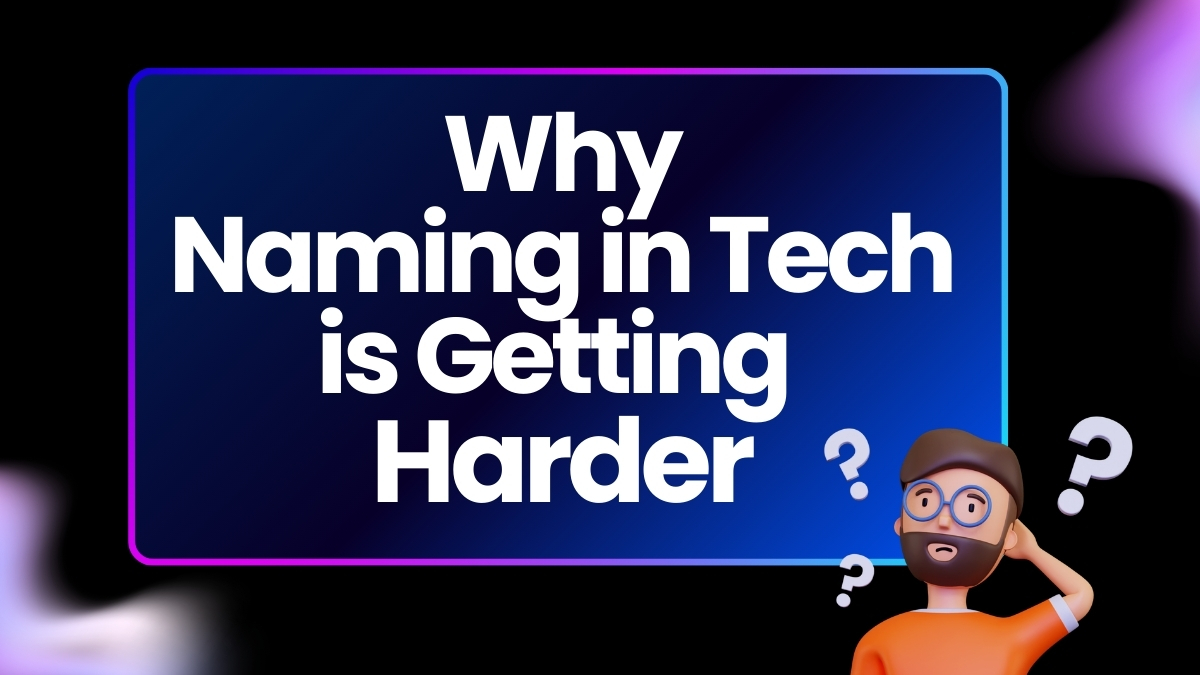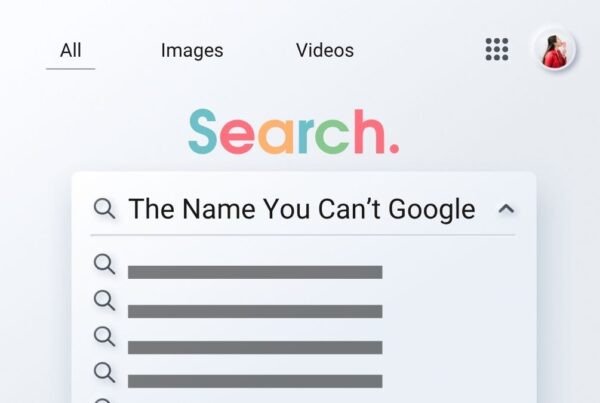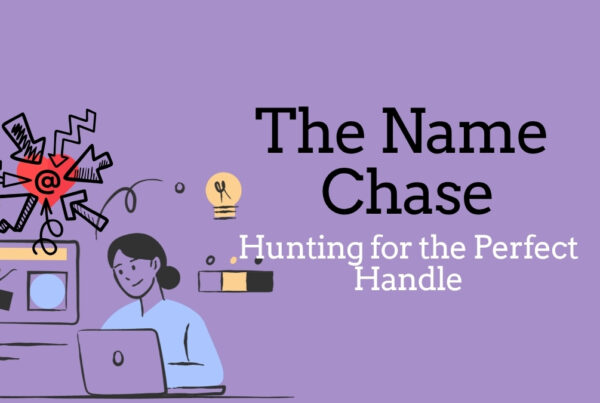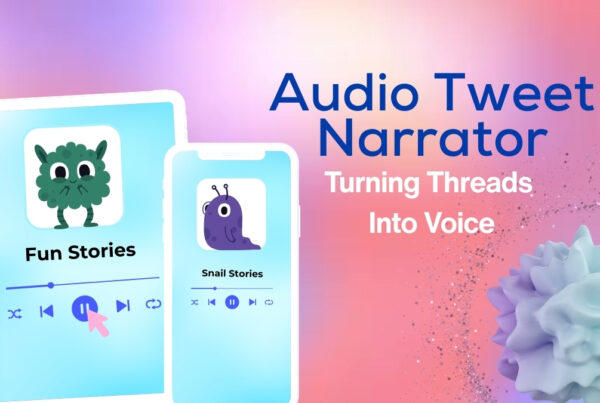Why Naming in Tech is Getting Harder (And Dumber)
In the rapidly moving realm of technology, choosing a catchy, memorable name was once considered part of the enjoyment. Now? It’s a tense rush with high stakes. Names that were clever, bold, and memorable—names that once allowed startups to distinguish themselves—have been replaced by plain, safe combinations designed for SEO that frequently resemble something a bot would produce. In fact, they sometimes are.
In an era where a prominent figure can determine a brand’s fate, the tech industry appears to be short on inspiration. Or even worse, it means abandoning creativity altogether.
The Naming Gold Rush is Over
All the Good Names Are Taken
The early internet era reminded us of the Wild West—securing a catchy dot-com domain felt like hitting the jackpot. However, the majority of the short, impactful names consisting of just one word are gone, having been acquired by domain investors or tied to decade-old startups that might not still be operational.
What remains? Names that lack vowels, have clumsy spellings, and rely on common suffixes such as “-ify,” “-ly,” and “-io.” Finding a .com domain that doesn’t sound absurd has become progressively harder, and even alternative TLDs (such as .tech, .ai, or .co) are beginning to seem overused.
From a branding perspective, the web is overcrowded. When good names are no longer available, what remains often feels forced.
From Clever to Cringe
Recall the times when “Google” seemed silly, “Slack” was a gamble, and “Dropbox” came off as almost too literal? These names became established due to their boldness, playfulness, and ease of pronunciation. Their effort was not very intense. Today, the trend in naming has changed direction—from clever to cringe.
Consider “X” (formerly known as Twitter). While it is minimalist, it also presents challenges in understanding and searching, and it lacks a distinct identity. Other startups pursue abstract combinations that seem to have been generated by shuffling Scrabble tiles: “Zaptix,” “Vurbly,” “Qurator.”
While these names may fulfill certain criteria on a branding matrix, they lack memorability. And to make matters worse, they come across as inauthentic.
AI and Buzzword Inflation
Everyone Wants to Sound Smart
In the current technological environment, buzzwords dominate the naming game. Add “AI,” “blockchain,” “quantum,” or “cloud” to a name, and it immediately sounds innovative—even if the product is unrelated to those technologies. This excessive use is weakening the effect of true innovation and complicating the task of companies that are genuinely disruptive to stand out.
It’s not only confusing for users but also misleading. The name suggests a promise it fails to fulfill, leading audiences to grow doubtful of any brand that relies too much on slang over time. Naming should encourage understanding rather than hide it.
The Rise of the Generic AI Name
Welcome to the era of sameness: OpenAI, Anthropic, Inflection, Cohere. These names all create the impression of having originated from a philosophy textbook or a science fiction novel; although they are intended to communicate an air of sophistication and intelligence, they risk becoming blending from one another. Even clones of ChatGPT adopt a similar strategy—like ChatThis, GPTThat, and others.
The naming formula is clear:
- Start with a vague but smart-sounding word
- Add a tech-sounding suffix
- Keep it sterile and safe
But this formula kills uniqueness. When 50 companies sound the same, the one with the weird, catchy name is the one that sticks. The rest become white noise in a loud, fast-scrolling world.
Naming by Committee (and Algorithm)
Creativity Lost in the Spreadsheet
A major reason for the downfall of bold naming in tech today? Consensus.
Branding choices that were once based on instinct or creative vision now undergo countless rounds of review: SEO audits, global trademark investigations, internal voting, and exhaustive lists of dos and don’ts. Though these verifications are crucial, they often drain the name of its vitality.
The outcome? A name that neither offends nor excites anyone.
Opting for a brand name that meets the demands of algorithms, search volume metrics, or linguistic neutrality across 150 countries results in dull, artificially constructed gibberish. Names turn into checkbox exercises—rather than being creative expressions of a company’s soul.
Startups Are Using AI to Name Themselves
It is ironic that a lot of startups are now generating their names with the help of AI tools. These tools examine databases of available domains, trending keywords, and naming standards to generate lists of options. Of course, this is efficient. However, the output often misses emotion, originality, or a narrative.
You receive names that are technically sound—easy to spell, pronounce, and available—but they feel as though a machine generated them (because they did). To make matters worse, a few of these names produced by AI resemble one another so closely that they can be mistaken for clones, which complicates the already difficult task of identifying oneself.
AI can assist in the naming process, but relying solely on it result in unwanted results.
How to Make Naming Less Dumb Again
Be Brave Enough to Be Weird (Smart-Weird)
Not every name needs to be clever, but it should be something. The most memorable tech names today—Slack, Notion, Figma, Stripe—aren’t just random. They’re weird in a smart way. They have personality, tone, and intention behind them.
What made these names work?
- Slack sounds casual and collaborative, which matches the tool’s purpose.
- Notion is abstract but intellectual—ideal for a workspace app.
- Figma is short, quirky, and brandable without trying too hard.
The common thread? None of them were chasing trends. They were built to feel human.
Great names usually come from a place of story, emotion, or even rebellion. The boldest names often start as “too weird” before becoming iconic.
Stop Naming for SEO, Start Naming for Memory
Yes, SEO matters—but not as much as memorability. You can optimize content all day long, but if someone can’t remember your name long enough to search it, you’re done.
Memorability is king in a world of short attention spans. A name should be sticky enough to lodge in someone’s brain after a quick glance or mention. That often means:
- Easy to spell and pronounce
- Visually distinct
- Emotionally resonant
A unique name builds organic SEO over time. Google rewards relevant content—but people reward names they don’t forget.
Build a Brand, Not Just a Buzzword
A name should be the start of a bigger identity—not just a placeholder. Too often, tech brands treat naming like checking off a box: quick, efficient, and optimized. But this misses the point.
Your name is the seed of your brand. It sets the tone, vibe, and expectation.
If you’re building something long-term, your name needs to age well. It should grow with your brand, not lock it into a fleeting trend or niche. Ask yourself:
- Will this name still feel right in 5 years?
- Can it expand into other products or markets?
- Does it reflect what your audience really feels?
Naming is emotional. Don’t skip the soul just to check the boxes.
The Naming Trend: From Functional to Forgettable
The Rise of the Algorithm-Driven Name
Historically, naming a tech company seemed like a creative exercise—a moment to characterize your product’s identity and introduce it to the world. However, due to the growth of automation and AI, the very act of naming has become a luxury.
Thanks to AI-driven name generators—tools that produce dozens of brand name suggestions based on factors such as industry, keywords, and target audience—it has become simpler to create “functional” names. Although these tools have a practical function, they lack one essential element: personality.
Names like ByteLift and NanoShift are generated to fit a specific algorithm and are undeniably effective from an SEO standpoint. However, they lack soul. When names start to look and feel like they were selected by a bot, they lose the power to captivate or engage with audiences. In a space where standing out is more important than ever, the rise of algorithm-driven names often feels like a step backward.
From Brand Story to Buzzword Soup
At one point, branding was about telling a story—a way to connect emotionally with an audience. This meant incorporating unique characteristics, values, and visions into a name. For example, names like Airbnb aren’t just functional; they evoke images of a community, of travel, of staying in someone’s home, and of finding affordable, unique lodging.
Today, however, naming trends have steered the industry away from storytelling and into the world of buzzwords. The temptation to slap industry buzzwords like blockchain, cloud, AI, and quantum onto everything from software apps to consulting firms is too strong. This overuse has made these once-powerful terms less effective.
In fact, a name that relies on these trends often feels hollow, as if the brand is trying too hard to convince customers of its relevance. The result is a landscape cluttered with forgettable names—ones that might check all the boxes but fail to create lasting impressions.
The Impact of Overused Trends in Tech Naming
The SEO Paradox: More Isn’t Always Better
As SEO becomes more critical for online visibility, many tech startups are turning their naming strategies into an SEO checklist. A simple search for popular keywords or phrases within their niche results in names like Cloudify, Techify, and AIHub. These names might seem to work well for SEO at first glance, but they can backfire in the long run.
Although these names may do well in the short run, they frequently do not separate themselves from rivals. Consider AI as an example. In the current technology market, it’s a huge buzzword. But what occurs when numerous companies within the same sector incorporate it into their names? The once powerful keyword becomes diluted, and the result is a sea of indistinguishable brands fighting for attention.
It is ironic that naming strategies based on SEO often overlook the bigger picture: being remembered is more important than just being found. It is important to be indexed by Google, but it is crucial to create a name that your audience remembers.
Naming for Memory vs. Visibility
It is essential to strike a balance between SEO and memorability. A name that is easy to spell, pronounce, and recall often holds more value than one that performs well in SEO but feels generic. Memorability is a valuable asset that marketers frequently fail to recognize. Ultimately, when did you last search for something on Google that had a name difficult to recall? So, possessing a memorable name can promote organic search traffic and customer engagement in a more sustainable manner.
In fact, memorable names often lead to organic searches, word-of-mouth marketing, and brand recognition without needing to rely heavily on SEO tactics alone. Take Slack, for example. Its name is short, simple, and memorable. It’s also evocative of the workplace culture it represents. Its rise to success wasn’t driven by clever SEO tricks, but by the fact that people could easily remember and talk about it.
How to Find Balance in Tech Naming
The Case for Simplicity and Clarity
In a world where numerous tech companies seem to think they must come across as complex or intellectual, simplicity is a virtue that is frequently ignored. While names like “TechCo” or “Appify” may not be the most creative, they possess a clarity that many overly complex names lack.
A simple, serious name has a certain strength to it. With simple names, customers can more readily grasp what your brand represents without having to unlock hidden language. While these names might not always be revolutionary, they are generally consistent, clear, and above all—memorable.
Companies like Dropbox and Zoom fit this mold. The names are easy to understand and instantly communicate the core functionality of the product. With names like these, there’s no guessing about what the company does. Simplicity and clarity help users connect with the product immediately.
Meaning vs. Ambiguity
In the search for something “one-of-a-kind” or “forward-looking,” numerous businesses go for names that lack clarity or precision. Consider Grok or X.ai—names that don’t straightforwardly convey the company’s offerings but instead seek to suggest an air of mystery or innovation.
Although these names can be memorable for some time, they frequently lack clarity. Names that are not clear can result in confusion, making it necessary for marketing strategies to clarify the brand’s mission and vision. This strategy can be effective in certain situations, particularly if you have the financial resources to support it with advertising and brand storytelling. However, for numerous startups, a name that is not clear can act as an obstacle instead of a pathway to success.
On the other hand, names that contain inherent meaning—like Mailchimp or Shopify—are self-explanatory. They immediately tell the user what the product or service does. Meaningful names don’t require extensive marketing explanations, making them easier to adopt and share within your target audience.
Conclusion
In tech, naming has evolved beyond the primary objective of being unique. It involves finding your way through a crowded marketplace, avoiding trademarks, satisfying algorithms, and achieving all this while keeping your brand’s essence intact.
Indeed, it is becoming more difficult.
But dumber? That’s optional.
In reality, the tech industry is not short on creativity; it is plagued by fear. Fear of being overly unusual. Overly ambitious. Too strange. Nevertheless, the winning names are nearly always those that had the courage to challenge the boundaries.
No matter if you’re coming up with a name for a SaaS platform, an AI tool, or the next social app, the same principles hold: clarity is key, it should stick in people’s minds, and most importantly, it should stand out.
If what you’re building is significant, give it a name that reflects its importance.
Curious how the biggest brands do it? In our next article, How Companies Choose the Perfect Brand Name, we break down the strategies, psychology, and surprising decisions behind some of the most memorable names in business today — and how you can apply those lessons to your own venture.




